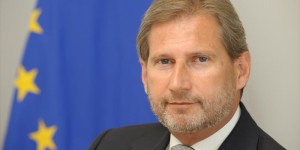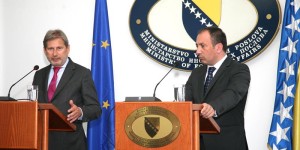Dear Ministers, Excellencies, Ladies and Gentlemen.
It is a real pleasure to be here with you today at this conference on a subject – very close to my own heart – but more importantly an essential subject on the overall agenda of the European Union in the Western Balkans region. The EU is happy to be associated with the work of the authorities in Bosnia & Herzegovina that eventually will ensure (i) adequate social protection policies, (ii) modern social protection services, including (iii) specific support for children with disabilities.
It is important that these aims are met. First and foremost for the well being of the citizens of Bosnia & Herzegovina. The European Commission’s 2013 Progress Report noted that, and I quote:
“As regards the socially vulnerable and people with disabilities, some limited steps have been taken to harmonise the social protection systems of the Cantons, introducing a social minimum for financial benefits. Entitlement to rights and benefits for the disabled is still based on status, not on needs. As a result, some categories of persons with disabilities do not receive adequate benefits. The implementation of the social protection legislative framework remains weak in both Entities.”
The necessary funds available to keep the social protection and inclusion policies on track will depends on conscientious and consistent policy decision-making in all responsible layers of government.
We are fully aware that the financial benefits and services provided by the respective authorities in Bosnia and Herzegovina are in some cases not sufficient to prevent families from falling into poverty. We also are aware that many vulnerable categories of citizens do not receive adequate protection. We know that efforts have been made to address and correct this, but those efforts must be strengthened.
We are also fully aware that Bosnia and Herzegovina is addressing these issues in a difficult economic climate. The financial crisis had a severe negative impact on the Bosnian economy – an impact that has led to the fact that the economy has not yet recovered to the GDP level attained in 2008. In 2012, youth unemployment increased to over 60% for the first time.
In addition, if the respective governments are to reduce their budget deficits to two per cent of GDP, formulating and implementing policies to maintain social protection will be a challenge.
This is another reason why the European Commission is particularly happy to be a true partner of a Bosnia & Herzegovina, by providing support to the project for the Social Protection and Inclusion of children currently in the amount of 1.4 million Euro (altogether four phases to be supported by the EU with 4.5 million EUR).
A word on the methodology. For Bosnia and Herzegovina to be able to deliver (i) adequate social protection policies, (ii) modern social protection services, including (iii) specific support for children with disabilities – the country needs internal coordination.
In order to bring the reform process forward in social protection, it is essential to ensure a continued vertical and horizontal coordination on social protection and inclusion. This mechanism could be for example based on an eventual overall coordination mechanism on EU matters.
For reasons well known to the public, the European Union believes that an overall coordination mechanism for EU matters needs to be established as a matter of urgency. The European Union Foreign ministers have expressed this on several occasions through the past couple of years. For that to happen, we will need to see the political courage and decisiveness to take Bosnia & Herzegovina forward on its EU path. The eventual successful establishment of this Coordination Mechanism will ensure that EU rules and standards will be implemented equally across the country and that EU financial assistance will support the agreed priorities.
Back to our subject today. In order to assist Bosnia and Herzegovina to eventually become eligible for the future IPA 2 funding in this area, a comprehensive consultation process was very ably managed and run by our implementing partner UNICEF. A set of Common and Individual Goals were identified by the relevant stakeholders in Republika Srpska, the Federation of BiH, and Brčko District. Based on these Common Goals, a set of Common Social Indicators were then identified to monitor the progress towards addressing the pressing social problems and priorities throughout BiH – they will be introduced later today and I trust they can command your support.
It is my personal hope that today’s conference will bring us further along the way to agreement on the future of Social Inclusion and Protection in Bosnia and Herzegovina. This is necessary not only from the financial IPA 2 perspective, but more importantly from the perspective of Bosnia & Herzegovina’s citizens: children, women, people with disabilities, and others who deserve to receive the adequate financial and other support.
In order for us collectively to succeed it is essential that all authorities throughout Bosnia and Herzegovina provide an effective follow-up to the common indicators to be agreed. The EU is here to assist Bosnia and Herzegovina on its road to the European Union and the ensuring of equal access to rights and a better future for its citizens.
Thank you for your attention and I wish you a successful conference.



